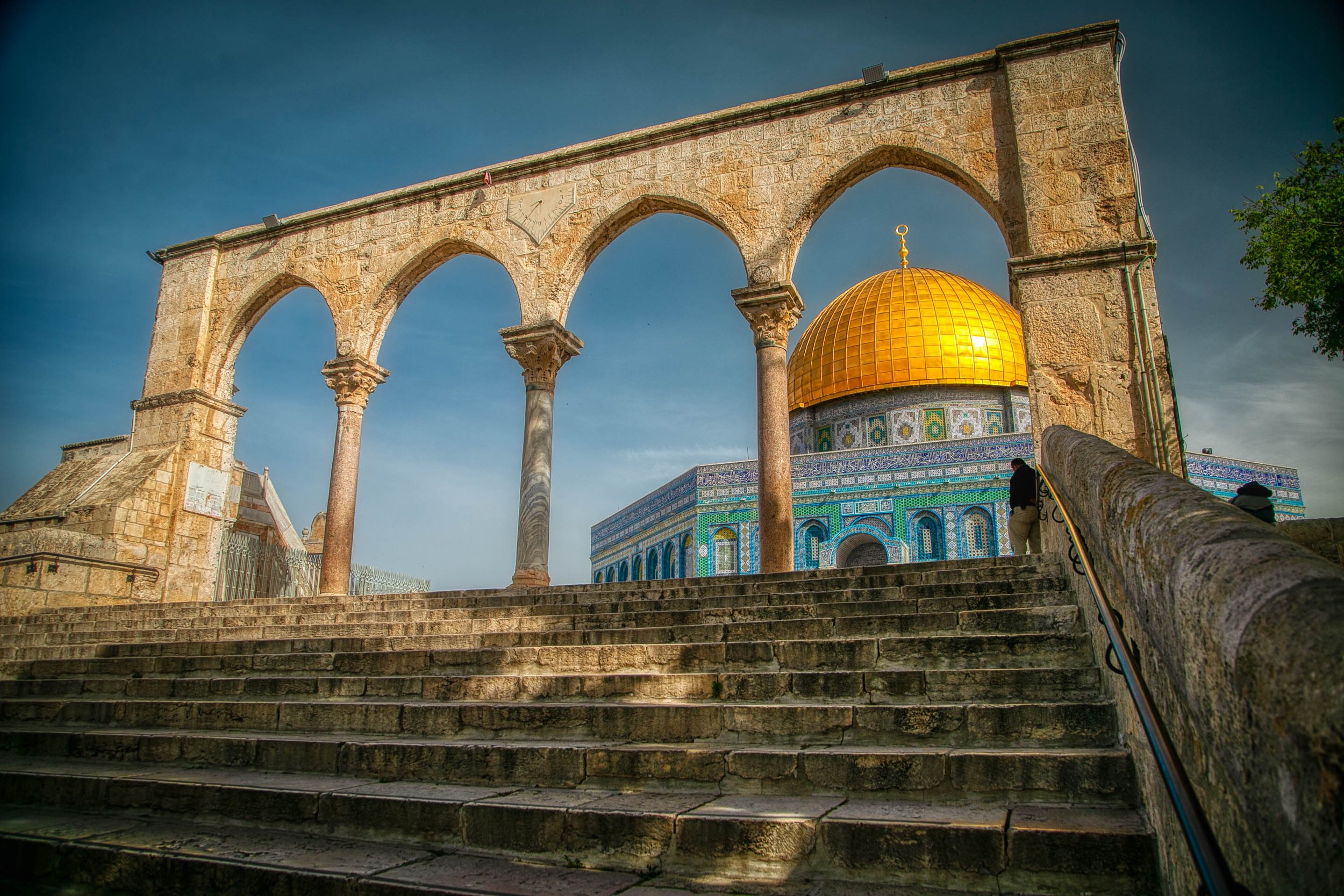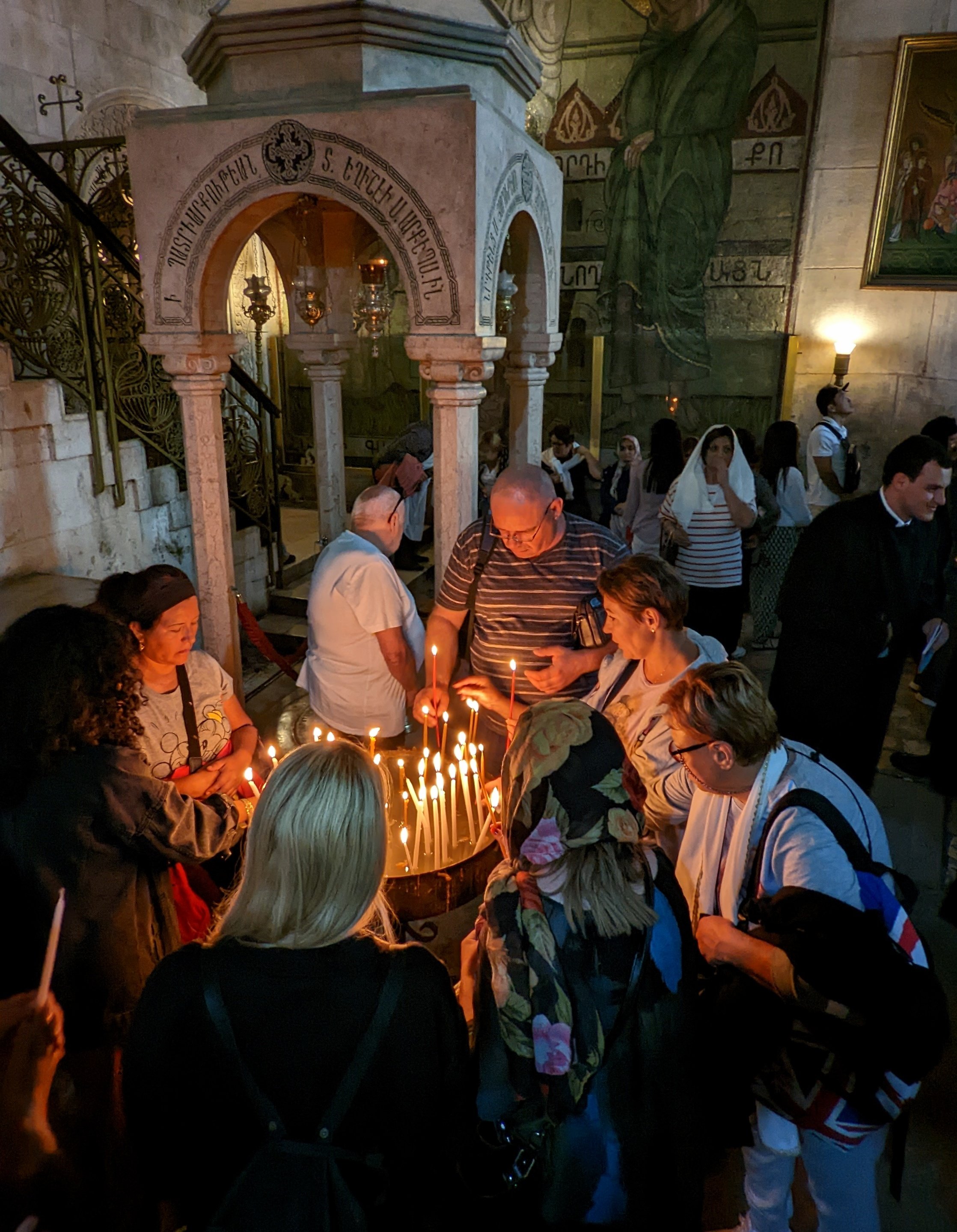
Peacebuilder’s Pilgrimage to the Holy Land
May 11-22, 2026
Registration is now CLOSED for the May 2026 Pilgrimage.
To be added to our waiting list, to inquire about future pilgrimages, or to experience customized pilgrimage options—please contact us for more information.
The Peacebuilder’s Pilgrimage to the Holy Land is an immersive learning journey through the Occupied Palestinian Territories and Israel, led by experienced peacebuilding practitioners. This unique pilgrimage goes beyond traditional site-seeing to engage deeply with the present-day realities on the ground, allowing participants to witness firsthand the efforts for peace and justice in a deeply divided region. Our itinerary includes visits to places such as Bethlehem, Jerusalem, and the Gaza envelope.
While most Christian pilgrimages to the Holy Land focus on ancient sites and “walking where Jesus walked,” few engage with today’s communities on the ground or consider the modern parallels and relevancy of Jesus’s words as one who lived under Roman military occupation. Our pilgrimage not only connects you with the historic Jesus but also with the living Christ, who offers hope to suffering communities today.
Our goal is to help you see a larger and more nuanced story. With the guidance of seasoned leaders who know how to navigate the logistical and bureaucratic roadblocks, you’ll learn about the history and current challenges of Christians, Muslims, and Jews in this land. Together, we’ll explore how faith and ethnicity are being weaponized—and how local peacebuilders are working across deep divisions to create hope amidst one of the longest-running conflicts in modern history.
This pilgrimage can stand alone or serve as preparation for a deeper dive into Palestine/Israel. We’ve timed the pilgrimage to coincide with the biennial Christ at the Checkpoint conference in Bethlehem, May 26-30. For those who wish to attend the conference, we can offer a group discount for registration and will coordinate local activities between the pilgrimage and the conference.
Registration is now closed for the May, 2026 Pilgrimage.
To be added to our waiting list, or to inquire about future pilgrimages, or to experience customized pilgrimage options—please contact us for more information.
-
Pilgrimages are transformative journeys that allow us to step away from everyday life and open ourselves to new perspectives. In the Holy Land, our pilgrimage is both a spiritual and relational journey—walking in Jesus's footsteps, listening deeply to the stories around us, and allowing these encounters to reshape our understanding of faith and justice.
During our days in Jerusalem and beyond, you’ll meet with local Christian, Muslim, and Jewish peacebuilders who will help you understand the social, political, and religious issues of the region. Through these conversations, we’ll reflect together on shared challenges, learning to listen actively to each other's diverse experiences.
Finally, we’ll explore how the lessons we learn in Palestine/Israel can inform our own peacebuilding efforts back home. Through dialogue with local leaders, you’ll gain practical insights on how to build momentum in your own context, whether you’re new to this work or already actively involved.
-
Sisters and Brothers,
We write to you with heavy hearts but steadfast spirits, seeking your solidarity and presence in a time of great need. The land where the prophets once walked has been enduring decades of turmoil, displacement, and violence. Our communities are under continuous attack, and our people, though resilient, feel increasingly isolated.
As people of faith and conscience we are called to follow in the footsteps of those who proclaimed liberty to the captives and comfort to the afflicted. Today many are held captive in Palestine, often in a literal sense, but also by the oppression and suffering inflicted upon them. The cries of our people resonate with the lamentations found in the Psalms, yet we hold firm to our faith and hope for peace.
We deeply appreciate the prayers offered from afar, but now, more than ever, we need our sisters and brothers to join us here, to pray with us, to walk with us, and to stand with us in our struggle for justice and peace. Your presence would be a powerful testament to the unity and compassion revealed in scriptures.
We extend this heartfelt invitation to you, asking you to come to the Holy Land and witness firsthand the reality our communities face. Stand in solidarity with us, be a voice for the voiceless, and help us amplify the call for peace and justice.
Together, let us embody the spirit of the prophetic message, bringing light and hope to those in darkness. May God bless you and guide your hearts to action.
Omar Haramy, Director, Sabeel Ecumenical Liberation Theology Centre
Rifat Kassis, General Coordinator, Kairos Palestine
Munther Isaac, Director, Christ at the Checkpoint Conference; Academic Dean, Bethlehem Bible College, Pastor, ELCJHL

Trip Details
-
As part of this Peacebuilder’s Pilgrimage, you will be given access to the new curriculum just launched by our friends at NEME, entitled, “Ascent to Jerusalem: Pilgrimage, Politics and Peacemaking in the Holy Land.”
You will be able to watch the videos and read the accompanying PDF text at your own pace, either individually or with a small group of your choice. We will also offer a recommended reading list.
Prior to departure, we will hold three preparatory Zoom calls to provide background on the history and context of Israel/Palestine, as well as foundational peacebuilding concepts.
The first meeting will be for the group to introduce ourselves and get to know each other. We will have a basic trip overview at this meeting.
The second meeting will be to hold a discussion around questions and comments that came up as people went through the curriculum and reading materials. We will talk about the land and orient the group towards our ethics of peacemaking.
The last meeting will be to meet some of our friends “on the ground” in Palestine/Israel who will be leading our trip. In this meeting, we will answer any practical questions that remain prior to the trip.
Through these calls, we’ll prepare to listen deeply and engage compassionately with the stories of those we will meet.
-
Our world is fractured and divided, with many of its longest lasting divisions converging in the Holy Land. Palestine has endured decades of military occupation, and the region continues to bear the weight of profound trauma on both sides. Both Israelis and Palestinians yearn for security and justice, yet the cycle of violence and instability often overshadows these aspirations. Religion, ethnicity, historical grievances, and traumas have been politically weaponized to dehumanize, and sow distrust, polarization and violence.
The ongoing genocidal war on Gaza has threatened the stability of the entire region, and its polarizing and violent effects ripple into the rest of the world. Gaza will grapple for generations with the long-term effects of siege, starvation, and utter devastation. At the time of this writing, the Gaza genocide continues and the fate of surviving Palestinians in Gaza is yet to be determined.
At the same time, conditions in the West Bank rapidly deteriorate, marked by increasing home demolitions, restricted movement, settler violence, land appropriation/theft, and ongoing displacement within the context of Israeli annexation of the West Bank.
The broader conflict demands sustained attention and action from all who seek a just and lasting solution.
-
This pilgrimage is for anyone seeking to deepen their understanding of Palestine/Israel through the lens of peacebuilders in the land, particularly (but not limited to) Palestinian Christian theologians and leaders. It is an invitation to reimagine a Christlike way of living out Christian vocation in today’s world—embracing practices of truth, mercy, justice, and forgiveness. Through theological reflection and firsthand encounters, you’ll gain tools and perspectives to live out your faith in a renewed, transformative way and to help build peace in the Holy Land.
-
Preparation is essential for this journey. In addition to the three preparatory Zoom calls, access to the NEME curriculum “Ascent to Jerusalem: Pilgrimage, Politics and Peacemaking in the Holy Land,” and suggested reading list, the pilgrimage includes 10 nights in the Holy Land buffered by an arrival night and final night in Jordan, for a total of 12 nights.
Since it is not every day that one makes a trip to the Holy Land, we are also offering an optional “group rate” to attend Christ at the Checkpoint in Bethlehem (May 26-30). During the days between the pilgrimage and the conference, we will arrange local (optional) activities such as short hikes, art classes, farming and solidarity opportunities, and more.
-
Our itinerary is carefully crafted by our experienced leaders—Mercy Aiken, Andy Larsen, and Cari Conklin—along with local partners at Sabeel Jerusalem.
Please plan to arrive in Jordan on May 11. We will spend the first night in Madaba, (near Amman) on May 11 th , which is covered in your trip cost. The pilgrimage “proper” begins the next morning, on May 12. We will leave Madaba bright and early to travel to Jerusalem—a journey of a few hours. Once we arrive in Jerusalem, we will check in to our hotel and begin our pilgrimage activities that same afternoon—i.e. we will “hit the ground running.” During our ten days in the Holy Land, we will visit key locations in and around Jerusalem, Bethlehem, and the Gaza envelope, including many places “off the beaten track.” Due to the changing context on the ground, our schedule remains flexible to prioritize current events and participant safety.
As a participant, you can expect to:
Learn from Jewish, Muslim, Christian and other peacemakers working to transform their society.
Worship with Palestinian Christians, reflecting on faith in the context of occupation.
Engage in interfaith dialogue and multicultural learning opportunities.
Witness the resilience and joy of the Palestinian community amid systemic challenges, including religious extremism, shrinking space, the wall, settlements, checkpoints, confiscated land and demolished homes, refugee camps, and environmental degradation.
Meet with locals who are working to uphold international and humanitarian law.
Act in solidarity with marginalized and threatened communities.
Understand the situation in and around Gaza with greater clarity.
Become empowered to help make a difference in the Holy Land.
-
Cost: The cost is $2,600 USD per person, covering all accommodations in Jordan, Israel, and Palestine (12 nights total), and all transportation from the time you arrive at the airport in Amman until you are dropped off at the airport in Amman. The cost also covers most meals (you may want to spend a little extra on snacks), speaker and guide fees, access to the curriculum, “Ascent to Jerusalem,” and pre- and post- trip zoom calls and information sessions. During this trip, our group will prioritize supporting marginalized Palestinian businesses, including hotels, restaurants, and guides.
Dates: May 11-22, with the first and last nights in Madaba, Jordan.
*Rather than depart for Jordan on May 22, there is also an option to remain in the Holy Land for the Christ at the Checkpoint conference which begins in Bethlehem on May 26th .
What’s Not Included: Airfare, visa costs for Jordan and Israel, a few light meals (possibly), health and travel insurance if you so desire, additional gratuities, personal items, incidental expenses, and any costs related to extended stays due to flight schedules.
Registration Process: After filling out the interest form, the trip leaders will be in touch with you to answer any questions and confirm your participation. Then, in order to complete your registration and reserve your place on the trip, you will be directed to make a $500 nonrefundable deposit.
-
If the cost is prohibitive for you, we can offer a link for personal fundraising on our website. Please reach out to us and let us know who you are and why you want to come. Be prepared to do the work of reaching out to your network for fundraising, etc.
-
We also offer customized pilgrimages for church groups, universities, and community organizations. Each experience can be tailored to focus on the peacebuilding themes and questions most relevant to your group. Contact us here to let us know your interest in a custom pilgrimage.
Pilgrimage
Facilitators
Andy & Cari
Conklin-Larsen
Mercy
Aiken
Local Speakers
While in the land, you will hear from many leading Christian, Muslim, and Jewish peace and justice advocates, including non-violent activists, theologians, women leaders and more, all of whom will provide depth, nuance, and insight to the situation on the ground. Our team on the ground in Jerusalem are well-seasoned and well-connected. As respected Palestinian Christian leaders, they have been doing this work for many years and have hosted thousands of international pilgrims.
You will also have the experience and leadership of the PCI team: Andy and Cari Larsen, and Mercy Aiken.








Photos by Andy Larsen
TO LEARN MORE ABOUT ISRAEL/PALESTINE & OUR WORK THERE…
Listen to episodes from our partner podcast, Across the Divide
LOOKING FOR MORE?
EXPLORE OUR PILGRIMAGE TO BOSNIA & HERZEGOVINA




